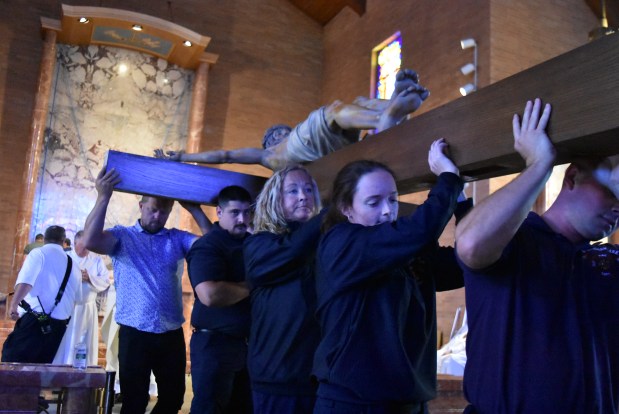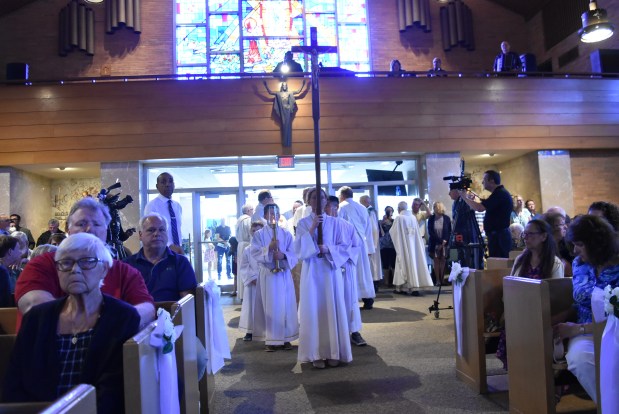My grammar school classmate and friend Kelly McCarthy sent me an email after he visited St. Bernadette church in Evergreen Park, which conducted its last Mass June 30 before merging with another parish due to declining numbers of parishioners and students.
“Before I left,” wrote Kelly, “I wanted to take something as a memento. My first thought was maybe one of those pay-per-view candles? Na.
“Then I thought, how about doing something that if a nun caught me, I would surely be slapped? So I texted a girl I had impure thoughts for: my wife, Susan. Take that, Sister Josephine (Josie)! And that, Sister Francis DeSales (Diesel). And you, Sister Eucharista (Euchee). And Sister Magdalena (Maggie)!”
He made me smile while also triggering memories of the church, school, convent and rectory that closed after 77 years.
I won’t forget the thrill of seeing my name in the altar boy schedule in the church bulletin the first time. Or the week when I served 6 a.m. Mass every day, when it was still dark and so cold in January that my mother had to call me a cab.
Kelly’s email got me thinking about wonderful Dominican nuns like the young and gentle first grade teacher Sister Killian, who implanted a love of learning by reading to us every day. Or Sister Joel in sixth grade, who astounded me by reading my essay aloud to the entire class, igniting my compulsion to write.
But it also put me in mind of Sister Mary Carol, my seventh grade teacher whom many of us would rather forget.
When I entered her classroom with about 55 classmates that September, Sister Carol was new to the school. Round faced, bespectacled and of medium build, she revealed little else behind the white robe and black veil.
But the first time I approached her desk with a question about an assignment, my head rang from a Will Smith style slap that I never saw coming. Why hadn’t I paid attention to instructions, she said.
Yet, Sister Carol is not to be confused with the ear pulling, knuckle rapping nuns caricatured in comedies like “The Blues Brothers.”
She lectured in measured tones with quiet confidence, often referencing her business experience in the secular world. Forty-ish, she was likely a latecomer to the convent and to our Catholic elementary school, chock full of 1,200 kids.
But it didn’t take long before we became jumpy because of her unpredictability.
Mid morning, after religion class, she would circulate among the desks, her hand stroking her chin during melodramatic decision-making about which student she would target.
Often, she selected a freckled face boy on whom many of the girls had crushes. She would kneel next to him and flirt, stroking his hair and shoulders, cooing in his ear.
This might go on for 10 minutes, while the rest of us smiled sheepishly, confused by the adult behavior and embarrassed for the boy. Finally, she’d rise and stalk the aisles for another boy for cuddling or, on rare occasions, a girl.
Afternoons, she transformed from Dr. Jekyll to Mr. Hyde, announcing softly but ominously, that someone among us had betrayed the Blessed Virgin Mary. I was so nervous that it might be me, that when she finally summoned a suspect to her desk, I was shamefully relieved by their misfortune.
More than once, her victim was the same boy, subject now to a withering interrogation that a detective might use to coax a confession. Each wrong answer, each stammer was punished with a roundhouse slap to the right side of his face, followed quickly by a backhand to his left. She held the back of his head steady with her other hand, to connect more solidly with the blows. Fifteen minutes felt like an hour as she turned his cheeks to watermelon, leaving him panting, his eyes filled with desperation.
His offense was never remarkable, as when she found “sinful” doodlings while rifling through his desk.
Her supply of seventh graders was plentiful. And no one was immune, we were horrified to learn, when one afternoon she attacked a top student who was also the most perfectly behaved, grabbing a fistful of auburn hair with her left hand, pummeling her with the right, grilling her all through what should have been our geography lesson, the girl’s lip bleeding, her angel face perspiring as she bravely tried to keep from crying: A beautiful 12-year-old who likely had never heard an unkind word from an adult before.
The nun’s suspicion that the girl had gone to a boy’s house, instead of home for lunch, accounted for her rage.
When she finally let up, telling “Honey,” to clean her face, the rest of us remained frozen, dumbfounded, our hands folded on our desks.

Sister Carol, if she’s alive, would be over 100 today. My wife, Marianne, who taught alongside Dominican nuns at St. Barnabas, wonders if alcoholism was the cause of Sister Carol’s split personality disorder.
Today, a fourth of my seventh grade classmates are dead, including the sweet girl and the oft victimized boy.
Also gone are nearly all of the parents who likely never knew the truth. For the era was a perfect storm for child abuse, when the highly regarded Dr. Benjamin Spock condoned corporal punishment and “spanking” for child rearing, and parents had unquestioning trust in the religious to carry it out.
Such disturbing misconduct is less likely to happen today since the nuns are gone from schools, teachers more professional and accountable, and classes a lot smaller.
But it remains a cautionary tale for today’s parents to be vigilant and ask questions. Because their children, out of shame, fear or adult manipulation, might never tell.
David McGrath is an emeritus English professor at the College of DuPage and author of the newly released book “Far Enough Away,” a collection of Chicagoland stories. Email him at profmcgrath2004@yahoo.com.



